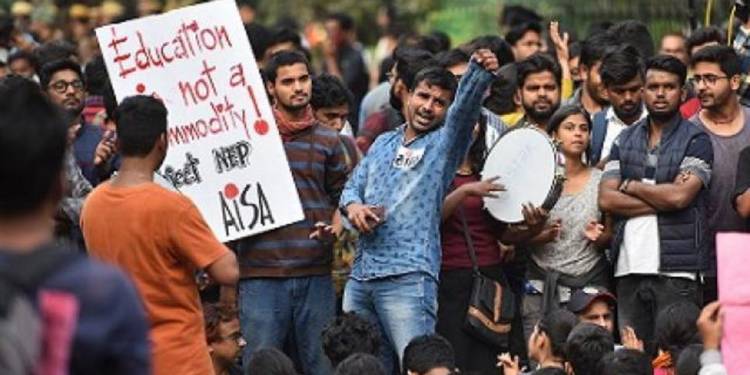The National Crime Records Bureau (NCRB) has released data which has brought into spotlight the issue of rising suicide rates in India. As per a recent report released by NCRB, twenty eight students committed suicide every twenty four hours in India in the year 2018. The figure has crossed 10,000 which is highest in the last decade. The NCRB data has also revealed that between 2009 and 2018, 81,758 students committed suicide, out of which 57% committed suicide only in the last five years.
Out of the 1.3 lakh suicides in the year 2018, around 8 per cent were students. It ought to be mentioned here that traditionally student suicides have been attributed to issues like rising pressure of competition within the country, increased curriculum, the fear of, or failure in examinations, personal issues of students, family issues and domestic disputes.
Such issues are largely seen as the cause of a high suicide rate among students. In fact, a quarter of student suicides took place due to “failure in exams”. Experts too blame causes ranging from drugs to depression, to broken families and breakups.
However, recent events have revealed that the rising suicide cases amongst students may not only be limited to psychological or academic issues. The recent events at JNU expose how politicisation of the University campuses might also have a role to play in aggravating the stress factor that has led to a spike in student suicides.
There was a time when ragging in college campuses across the country had become a huge issue. The issue has still not been completely tackled as was illustrated by an incident involving commission of suicide by two Madurai College students.
While we correctly see ragging as an issue that leads to traumatisation of innocent students, there has not been much debate and discussion about how politicisation of campuses could be contributing to the stress factor that results in student suicides.
Take the case of JNU, for example, where leftist organisations have disrupted academic activity. Earlier this month, a group of masked students had forcibly entered the office of the Center for Information System, switched off the power supply, forcibly evicted all technical staff and made servers dysfunctional with the intent to not allow online registrations to take place. It was the last day for registration for the Winter Semester, and many students had flocked in despite facing hostilities by left goons allegedly from SFI, AISA led by JNUSU itself.
Even in December, there were reports of the academic atmosphere in the Central Varsity getting vitiated. The JNU administration was forced to come up with unique means for conducting examinations- through Whatsapp and email. It must be kept in mind that an average, innocent student doesn’t take admission in a University to achieve political objectives.
The foremost goal of any average student is not to indulge in political activities, but to make a future for himself/ herself and to contribute towards nation building. Depending upon the socio-economic conditions of individual students, many of them represent sheer hope for their families.
However, a bunch of students who see University campuses as political launchpads, and not temples of learning, disrupt academic activity ultimately ruining the ambitions and careers of those who really look up to University campuses as places of academic pursuit.
In fact, JNU has also witnessed suicide cases in the recent past. In May 2019, a second year MA English student of the JNU was found hanging from a ceiling fan in one of the rooms of the School of Languages. In the month of March last year, a 26 year old PhD scholar from JNU had also committed suicide at his rented accomodation in Bed Sarai area of South Delhi.
There is no denying the fact that student suicides are on rise across the country. It is also clear that increasing stress levels and academic issues including fear of failure during examinations has have contributed to rising student suicides.
JNU represents a phenomenon of politicisation of University campuses across the country, which extends to vandalism and disruption of academic activity. This could at least contribute to aggravating the pressure levels on innocent students, who already face a plethora of issues.
Right to protest is not tantamount to the right of disturbing and potentially ruining the careers of other students. The University administrations, especially in case of those Universities which are vulnerable to politicisation must guard against such elements. The NCRB and other government agencies too should conduct research into the largely unexplored domain of how mala fide political activities might be one of the factors behind increasing student suicides.





























